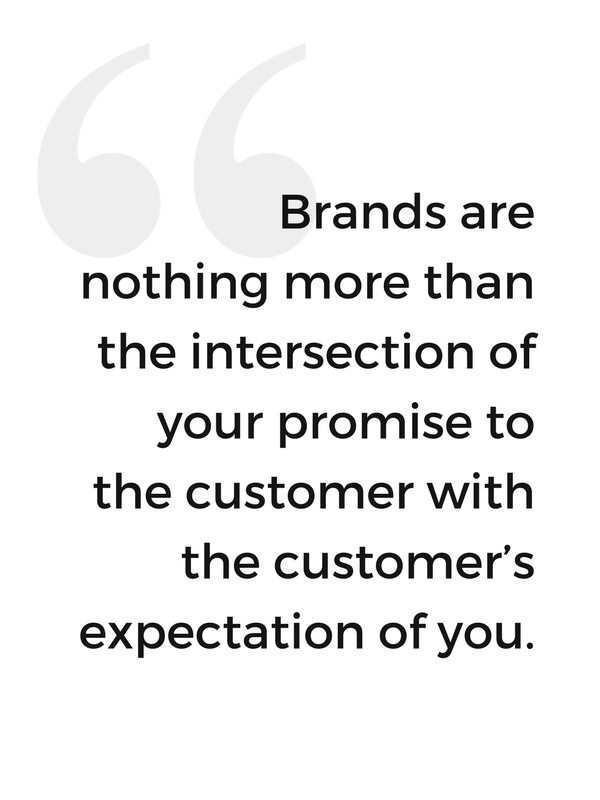 love launching new brands. In fact, I’m currently helping four startups either conceive their brand from scratch or rethink their brand as they start to get traction and need to position themselves more effectively.
love launching new brands. In fact, I’m currently helping four startups either conceive their brand from scratch or rethink their brand as they start to get traction and need to position themselves more effectively.
One of my favorite parts of the exercise is brainstorming all the elements of the core brand – things like the unique selling proposition, founder/market/customer stories, key visual and the brand experience. Imagining how actual customers are going to ‘walk’ through the website, how we’re going to answer the phones, what’s going to be written on thank you notes, and other countless details that build a rich, complex brand experience, are all incredibly rewarding to think through and create.
 Once we come up with the ‘bones’ of the brand, and the myriad ways we can express it, the next step is usually creating a brand bible. Brand bibles shouldn’t be confused with graphic standards manuals – they go far beyond simple graphic and color rules. The brand bible is about fundamentals. It actually shapes how the brand develops and matures.
Once we come up with the ‘bones’ of the brand, and the myriad ways we can express it, the next step is usually creating a brand bible. Brand bibles shouldn’t be confused with graphic standards manuals – they go far beyond simple graphic and color rules. The brand bible is about fundamentals. It actually shapes how the brand develops and matures.
So it was exciting to get permission from Family Sparks, one of my clients, to profile their new brand bible. This is a big deal – each bible is a treasure trove of insights on the brand. Although I’d never reveal the full contents, they said it was OK to offer a few glimpses in this post. More helpful, though, I thought I could take this opportunity to describe how you can create your own brand bible.
Start With Questions
Brands are nothing more than the intersection of your promise to the customer and the customer’s expectation of you. That sweet spot at the center of the Venn diagram – where what you promise overlaps perfectly with what your customer needs – is the motherlode.
Getting to that motherlode can be daunting if you try to imagine it all yourself. Or it can be remarkably easy (but time-consuming) if you simply ask the right people the right questions.
This isn’t the time or place to map out all the questions I ask in my brand work; you can get a complete workbook of my templates here. Suffice it to say that allowing people close to your product/service/company to verbalize what makes you special is an enlightening experience. In fact, the interviewees usually deliver incredible insights that, with a bit of contemplation, brainstorming and polishing, become the foundations of your brand.
Brainstorm With Focus
Brainstorming can be productive. Or it can be a good way to waste time. It all depends on how you structure it.
Armed with my research insights, I guide members of the brand team (generally founders and close stakeholders – never more than 6 people) through exercises that actually lead to sections of the brand bible. My favorite brainstorm areas are:
- The brand essence: How would you express the brand in one sentence in a way that makes me light up with excitement?
- The brand story: Start with the sad state of the world prior to the brand; move on to the ‘aha’ moment that led to the brand; finish with the happier state of the world today.
- Brand adjectives: What five adjectives would you use to describe the brand?
- Name, modifier, tagline: Does the name make your offering easy to ‘get’? Does it stand out and excite me? If not, how do we modify it – taking a crappy name like Boeing 747 to a great name like Boeing 747 Jumbo Jet. And what’s a single summary of your essence that can appear beneath that name?
- The unique selling proposition: Again, a bit complex to go into here – my Brand DIY Playbook explains it nicely – but in short: What do you do better than anyone? Why’s that? And why is this superior offering important to your customers?
- The customer profile: Tell me about one person who loves what you do. No, really tell me about this person. What does she love and hate? How has life let her down? Let’s get into a few complexities. I want to see her materialize right here in front of us.
- Brand loves: If our brand got to hang out with three brands it admired, what brands would they be?
- Logo: No, you won’t nail it in the brainstorm. But you’ll certainly be able to gather up ideas and influences aplenty – which will then go to your designer for actualization.
- Expressing the brand: Sure, it’s only a brainstorm, but if our brand were three years older, what would be our ‘go to’ ways of getting the message out?
My favorite way of staying on time and focused is to arm each brainstormer with post-it notes and a sharpie and go from page to page of presentation paper. Each page has one of the titles above. I explain what we’re trying to get at, then we ideate noisily for 20 minutes, hang the post-its, debate, and move on. Not perfect, but speed and excitement beat paralysis by analysis every day. Honing can come later.
Write As a Team Sport
Sure, it would be easy (or relatively un-painful) to simply draft up the brainstorm findings into a word doc brand bible. But then I’d be the only person who owned it – my clients would feel done unto, instead of feeling like proud parents. Bad start.
So I do a bullet point draft and let my clients have some fun with the red ink. Four or five drafts later, we have a version everyone can be proud of.
Ah, wait, you ask…what stops this from turning into a committee clusterf&%k? The short answer is me. My role at this stage is to elevate the product. When team members start debating sentence structure, I gently grab the red ink pens and proudly announce we’re ready for the final draft.
Get a Grown Up Designer
I’ve worked with hot designers. And I’ve worked with seasoned, smart designers. I always go with the latter on brand bible jobs.
Simple reason: experience builds confidence and discretion. A grown up designer will be able to accept client tweaks to the look and feel of the brand bible document without acquiescing the fundamentals and setting off on a wild goose chase that burns time, money and nerves. Hot designers tend to pick all the wrong hills to die on. Not a pretty sight.
 The best part of bringing aboard a tried and true designer? They come up with brilliant work that actually works. Ever have a designer come up with a logo that won’t work as a lapel pin, or in black and white, or in Chinese? It’s something you do only once.
The best part of bringing aboard a tried and true designer? They come up with brilliant work that actually works. Ever have a designer come up with a logo that won’t work as a lapel pin, or in black and white, or in Chinese? It’s something you do only once.
So who’s my go-to designer these days? Brad Felt, take a bow.
Socialize It
You’re proud of the brand bible. Your client is proud. But what about everyone else in the company?
When we’re about halfway through the design stage, I take an unfinished version and shop it around to employees and stakeholders who haven’t been privy to the project. I incorporate their feedback. I make them feel that they had a real role in the bible’s creation. Trust me, buy in is a very, very valuable commodity.
Execute
Congratulations, you’re ready to launch.
Now the job becomes execution. Ensuring the great tactics in the brand bible are thoughtfully and diligently executed, day in day out. Far too often, I’ve seen brilliant brands launch and flame out because there was nobody to do the daily work of making it real.
So find that ‘doer,’ and make your brand bible a living gospel.
This originally published on Marc’s blog.



